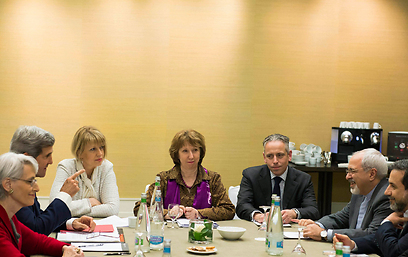On eve on nuclear talks, Khamenei says Israel 'doomed to extinction'
As Netanyahu takes off for last ditch
effort to block nuclear deal with Iran, Khamenei claims Iran will never give up
nuclear rights, blames France for 'kneeling before Israel', levels indirect
threat to 'slap aggressors in face'
News
agencies
|
|
Israeli Prime Minister Benjamin Netanyahu
took off on Thursday for Russia in a last-minute bid to sway an emerging deal with Iran
over its contested nuclear program.
Meanwhile, Iranian Supreme Leader Ayatollah Ali Khamenei
said Tehran wanted friendly ties with all countries, including the
United States but said that Israel is "doomed to extinction."
Related stories:
"The Zionist regime is a regime whose pillars are extremely shaky and
is doomed to extinction," Khamenei told commanders of the hardline
Basij militia force in Tehran.
"Any phenomenon that is created by force cannot endure," he said in
comments broadcast live on state television. "The enemies of Iran
sometimes and particularly the rabid dog of the region - the Zionist
regime - malevolently claim that Iran is a threat to the entire world,"
Khamenei said.
Netanyahu is to meet Russian President Vladimir Putin
at the Kremlin on Wednesday evening to voice his concerns about the
deal being hammered out at talks in Geneva.On Thursday, he will address
members of the Russian Jewish community.
 Nuclear talks (Photo: Reuters) Nuclear talks (Photo: Reuters)
Before an audience of militiamen, Khamenei said he would not allow
any "retreat" on its rights: "I insist on stabilizing the rights of the
Iranian nation, including the nuclear rights," Khamenei told the
militiamen of the Basij force in Tehran, in remarks broadcast live on
state television.
"I insist on not retreating one step from the rights of the Iranian
nation," he said, adding that "We (Iran) want to have friendly relations
with all nations, even the United States. We are not hostile to the
American nation. They are like other nations in the world," he said.
Khamenei took special effort to slam France, which took a
hardliner position regarding the deal with Iran, saying French officials
were "not only succumbing to the United States, but they are kneeling
before the Israeli regime" and said Iran would "slap aggressors in the
face in such a way they will never forget it" without mentioning any
specific country.
In response, the militiamen chanted "Death to America."
Iranian President Hassan Rohani
made similar claims in phone call to Britan's Prime Minister David Camron: "As Iran
is determined that its nuclear activities will remain peaceful, it
will strongly defend its nuclear rights," the official IRNA news agency
reported Rohani as telling Cameron.
"We will accept no discrimination on this issue. The language of
respect must replace that of threats and sanctions," he added.
Israel
is staunchly opposed to the mooted interim agreement, insisting it
will give Iran vital sanctions relief while failing to halt Tehran's
alleged march towards a "breakout" nuclear weapons capability.
The P5+1 – of which Russia is a member alongside the United States,
China, France, Britain and Germany – will reconvene with Iran on
Wednesday in Geneva for talks on the program.
"We hope the efforts that are being made will be crowned with success
at the meeting that opens today in Geneva," Russian Foreign Minister
Sergei Lavrov told a joint news conference after talks with Brazilian
Foreign Minister Luiz Alberto Figueiredo.
Lavrov said in remarks broadcast on Saturday that chances of reaching
an agreement were very good and the opportunity should not be passed
up.
He has also suggested Iran is prepared to produce less enriched
uranium and halt production of uranium enriched to a fissile
concentration of 20 percent, a relatively short step from weapons-grade
material. Those are two of the steps Western powers want Iran to take.
Russia, which built Iran's first nuclear power plant and has much
warmer ties with Tehran than the United States does, has expressed less
suspicion than Western powers that Iran may be seeking to develop
nuclear weapons capability. Iran says its nuclear program is for
peaceful purposes only.
The last round of talks with Iran that ended on November 10 came
tantalizingly close to a framework agreement that supporters say would
bolster Iran's new president, a reputed moderate, and buy time for
negotiating a comprehensive deal.
Moscow has expressed hope the differences could be ironed out, with
Putin telling his Iranian counterpart Hassan Rohani on Monday that "a
real chance has now emerged for finding a solution to this longstanding
problem."
Israel's deputy foreign minister, Zeev Elkin, said his country did not expect a radical change in Moscow's stance.
"Russia is not about to espouse the Israeli position," he told public
radio ahead of taking off to Russia with Netanyahu. "But any small
budge could influence the whole process."
Iranian news agency IRNA said Rohani also held talks on the telephone
with Chinese President Xi Jinping, telling him Tehran was seeking "an
accord which preserves its rights and shows that the Iranian nuclear
program is totally peaceful."
He called for China to oppose "excessive demands of certain
countries," referring to France which took a tough stand at the last
round of talks in Geneva at the start of November.
Parliament speaker Ali Larijani, meanwhile, insisted in a speech to
MPs that the Islamic republic would fully defend "its nuclear rights" in
Geneva.
AFP, the Associated Press and Reuters contributed to this report
|
|

No comments:
Post a Comment